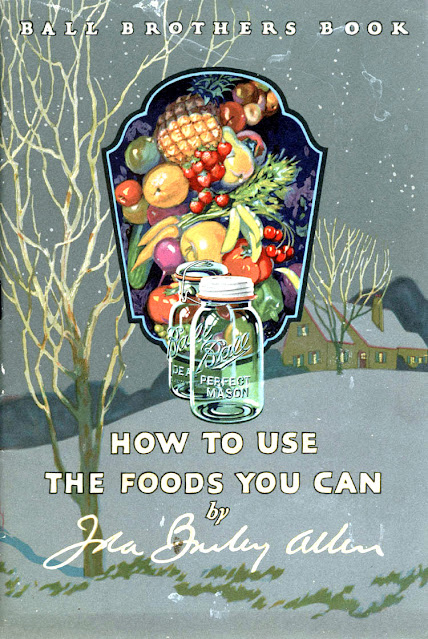How are we doing on our plan to use up older items in our pantry? My biggest concern was canned goods…especially those we buy. By yesterday we had used 82 jars or cans from our pantry…in a little over 10 weeks since the first of the year. I count jars of jam, jelly, honey, syrup, meat, soup, pickles and relishes, beans, fruit and vegetables, whether home canned or purchased. Those jars and cans are generally sized for two people. I let my spreadsheet that I use for inventory to keep track of the jars on hand and what was used.
A nice little booklet available online is Ball Brothers “How to Use the Foods You Can”, available to view and download HERE. From 1924, doesn’t have canning recipes, it has lots recipes and menu ideas to use your canned food. I like the idea that they encourage canning all year round to keep your jars full all the time. I can meats and soups in the winter after we have emptied fruit and vegetable jars canned in summer.
“What a treasure a cupboard would be with a thousand Ball Jars of canned foods upon its shelves. Learn to can the season through, while cooking. A jar of pineapple, some uncooked canned strawberries,—cold-water processed rhubarb,—asparagus—tender carrots,—refreshing fruit juices—the seasons through. But would that make a thousand jars,—and how would they be stored? What of the Fall, Winter and Spring months—of the empty jars that stand idle—the Fall and Winter foods that may be used to fill those jars? Apples, citron, cranberries, the last green peppers, cabbages, green tomatoes; fill the jars emptied in October; in November , fill as fast as they accumulate with mincemeat, pumpkin and squash pie filling; in December, orange marmalade, chutney and apple cranberry jelly or cranberry conserve can be made for Christmas presents.” Ida Bailey Allen, Ball Brothers Book “How To Use The Food You Can.” 1924
So we traveled to our nearest Aldi to pick up some cases of canned items and produce. I recently canned chicken thighs and sale hamburger into hamburger mix in March to help clean out our freezer so I can defrost it soon, and I canned more bean soup and split pea soup this week, using frozen sale priced ham shanks, to replace what we have used and to get more meat out of the freezer.
We have used all our canned goods that predates "use by 2021", so we’re in good shape. Our pantry is mostly basic groceries we use all the time: rice and barley, oatmeal and grits, pasta, dried peas, lentils and beans, flours, sugar, honey, seasonings and condiments in smaller amounts, and other 0baking supplies and home canned and purchased canned goods. Most of the non-canned foods are bulk purchases. We have a freezer in our heated, attached garage.
We find canned goods are useful when we don’t have power to cook as they can be eaten from the jar if necessary, and they include liquid if you don’t have a water supply either in an emergency. And of course, they are shelf-stable, no refrigeration needed. It's great not to have to thaw anything before use, making last minute menu changes easy. The other plus is we rotate them into our daily meals regularly. My mother and mother-in-law both canned and stocked a "fruit-room or root cellar" and we learned to help preserve and eat what our families grew.
Right now, it appears that investing in a pantry has saved us money as we are eating at 2020-2021 prices, a better return than a bank account. I am replenishing the pantry at sale prices whenever possible. I shop for the pantry and freezer inventory and plan our meals from that instead of impulse buying at the last minute. I have increased our level of supplies this time because of rising prices and uncertainty about what's ahead.

